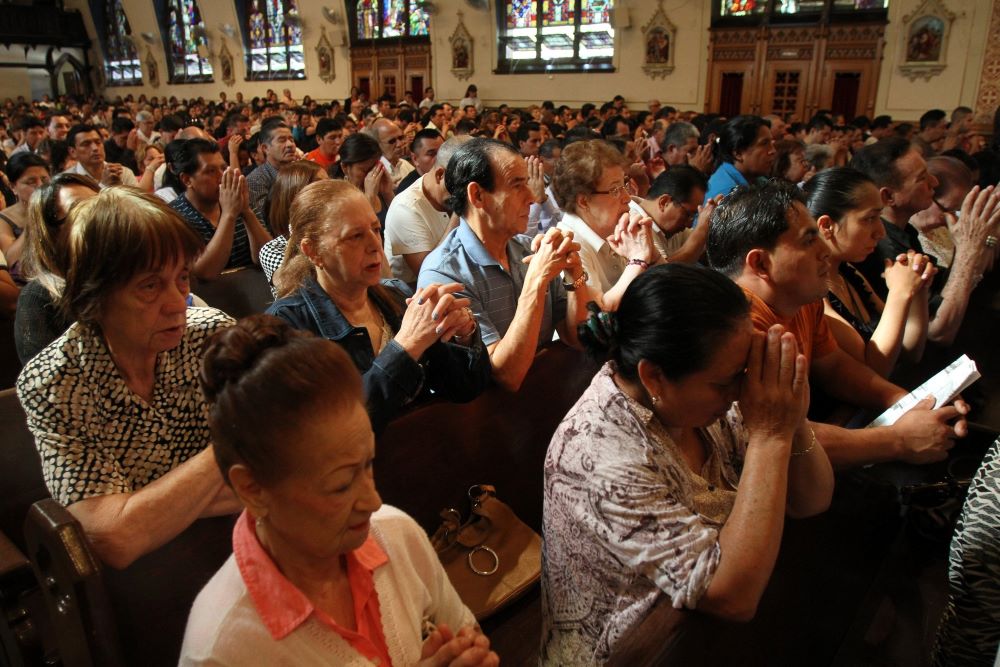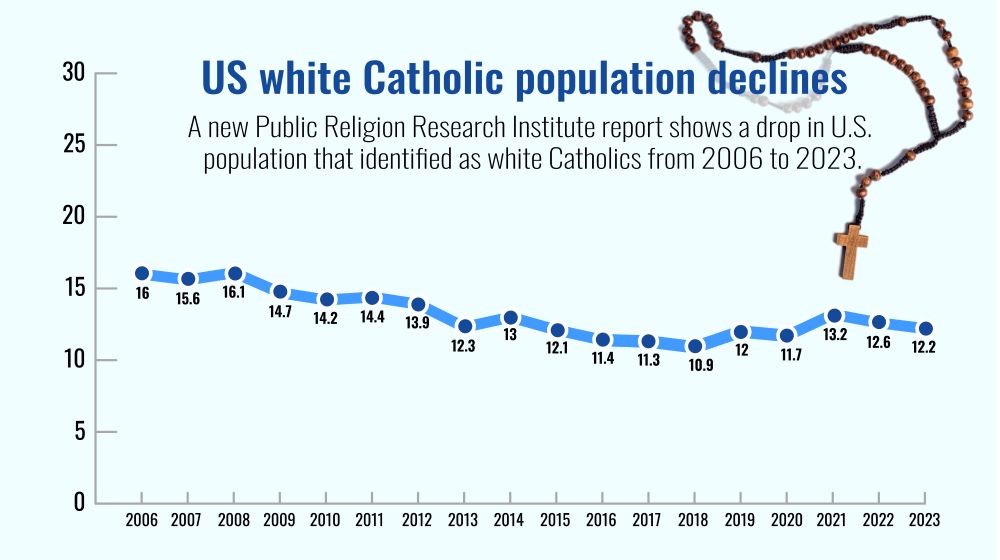
People pray during a Mass for immigration reform at Our Lady of Sorrows Church in the Corona neighborhood of the New York borough of Queens. A new PRRI report shows that as the U.S. has become more racially and ethnically diverse, the percentage of white Christians has declined more than 15% since 2013. (OSV News/CNS file, Gregory Shemitz)
White Catholics are the oldest religious demographic in the United States with a median age that is 10 years older than Americans as a whole, according to a new report from the Public Religion Research Institute.
Based on data from about 500,000 interviews over a 10-year period, the 2023 PRRI Census of American Religion, released Aug. 29, also finds that more than a quarter of Americans — 27% — do not identify with any religious tradition.
The data indicates that a growing number of older Americans — those over age 50 — are leaving their religious upbringings behind, while more than a third of those between ages 30 and 49 are now religiously unaffiliated.

(NCR/Toni-Ann Ortiz/PRRI)
The institute's findings on religious demography, based on data from 2014 to 2023, "tell important stories about change and continuity in America," PRRI CEO Melissa Deckman said in prepared remarks about the report.
"While the number of religiously unaffiliated Americans continues to increase, white Christians are declining as a portion of the U.S. population due to increasing disaffiliation and growing racial and ethnic diversity," Deckman said.
As the United States has become more racially and ethnically diverse, the percentage of white Christians has declined, according to the report. In 2023, white Christians made up 41% of the population, down significantly from 57% in 2006.
By contrast, 25% of Americans in 2023 identified as Christians of color, a group that has remained relatively consistent throughout the last decade, according to the PRRI report.
Less than a quarter — 22% — of the U.S. population is Catholic. The report finds that 12% of the population identified as white Catholic — down from 16% in 2006 — while 8% percent identified as Hispanic Catholic and 2% as Catholics of color.
'While the number of religiously unaffiliated Americans continues to increase, white Christians are declining as a portion of the U.S. population due to increasing disaffiliation and growing racial and ethnic diversity.'
— Melissa Deckman
Over the last decade, the median age of white Catholics has grown from 53 in 2013 to 58 in 2023, the report says. That demographic is the oldest religious group in the country, slightly older than Jewish Americans (56), mainline Protestants (56) and white Evangelicals (54). The median age in the U.S. is 48.
The median age of other Catholic cohorts has also grown over the past decade: from 39 in 2013 to 45 in 2023 for Hispanic Catholics, and 43 to 49 for other Catholics of color, according to the PRRI data.
Mirroring a trend across all religious backgrounds, younger generations of adult Catholics are increasingly non-white, the report says. Between 8 and 10% of American adults ages 18 to 49 are Hispanic Catholic, while 7-8% of adults in the same age bracket identify as white Catholics.
The PRRI report also analyzes the religious demographic data by political party. For example, a third of self-identified Democrats are religiously unaffiliated, making them three times as likely as Republicans — 12% — to not identify with any religion.
For Republicans and Democrats, the percentage of white Catholics in their base has remained constant, at 17% and 10%, respectively. Democrats tend to be more diverse, with higher percentages of Hispanic Catholics and Black Protestants than Republicans, according to the PRRI data.
Though white Catholics are divided politically, the PRRI data shows that they lean Republican: 38% identified as Republicans, 31% as independents, and 25% as Democrats.
Advertisement
As for where Catholics live in the United States, the report indicates that 59% of white Catholics live in the suburbs and are predominantly concentrated in traditional Catholic strongholds in the Northeast, Midwest and southern Louisiana.
By contrast, Hispanic Catholics live equally in suburban areas (47%) and urban centers (46%) and are mostly concentrated in the West and Southwest, especially in counties near the U.S.-Mexico border, according to the PRRI data.
Other Catholics of color are primarily concentrated in Alaska, Hawaii and the Dakotas, the PRRI report said.








